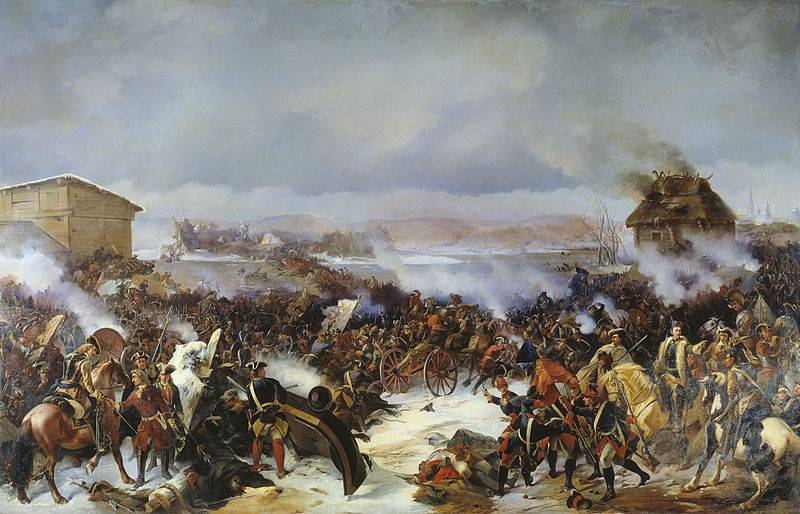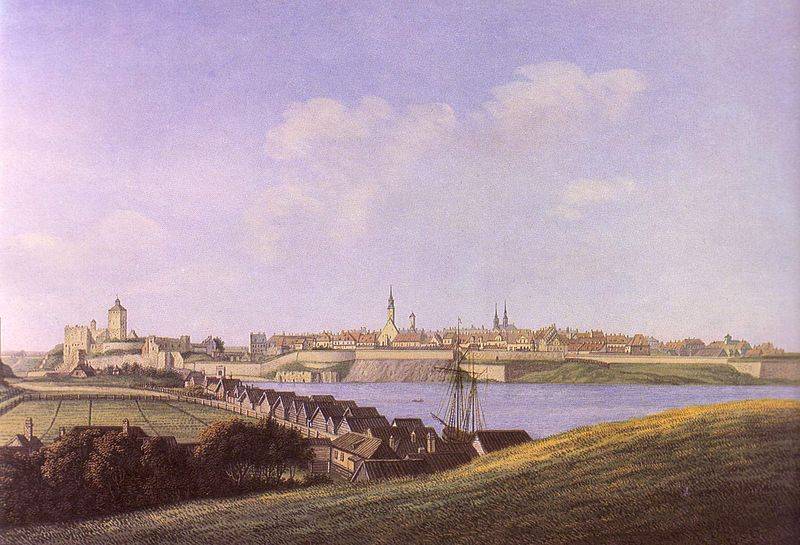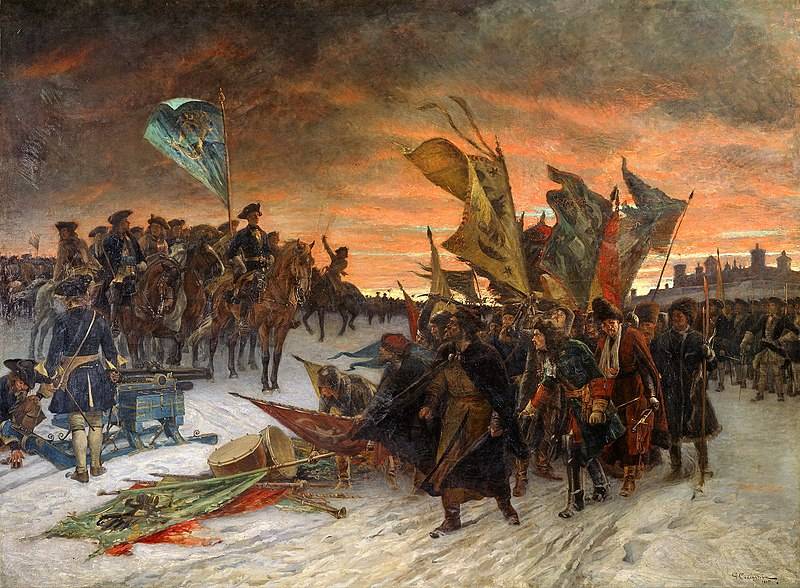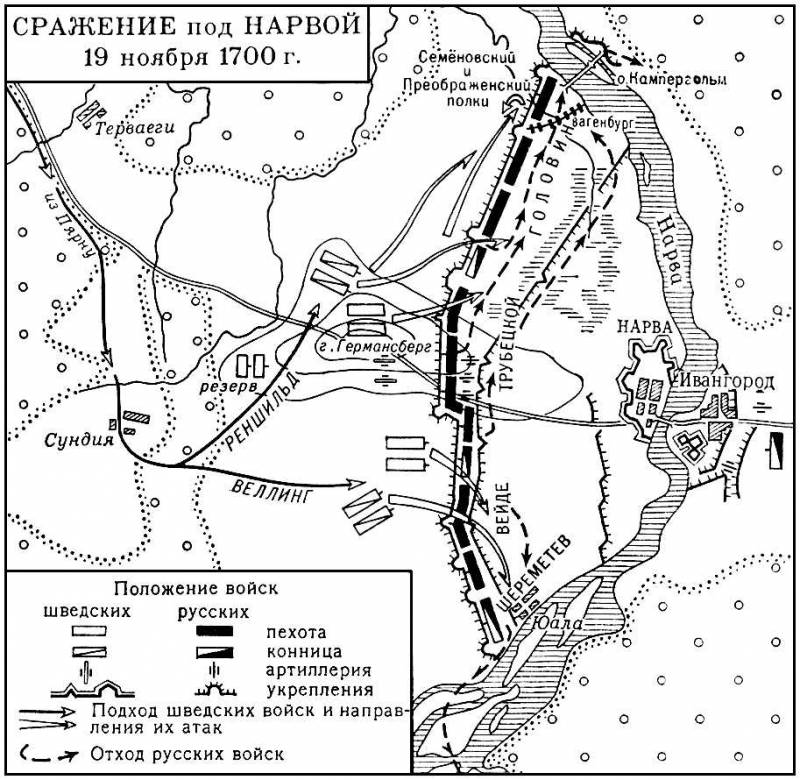Narva disaster of the Russian army

Painting A. E. Kotzebue "Battle of Narva".
320 years ago, the Swedish army under the command of King Charles XII defeated the Russian army near Narva. The Swedish king received the glory of an invincible commander. Russian troops to Poltava ceased to be perceived as a serious force.
The outbreak of war
In 1700, the Northern Union - Rzeczpospolita, Saxony, Denmark and Russia, opposed Sweden. The allies sought to undermine Sweden's dominant position in the Baltic region. The moment for the outbreak of war seemed auspicious. The great powers of Europe (England, Holland, France and Austria), as well as possible allies of Sweden, were preparing for the War of the Spanish Succession. Sweden was left alone. The situation in Sweden itself was unstable. The treasury is empty, society is dissatisfied. The young King Charles XII by his behavior gave his contemporaries reason to consider him a very frivolous person. It was hoped that the Swedish monarch, keen on hunting and other amusements, would not soon mobilize the forces of Sweden to repulse the enemies. In the meantime, the allies will be able to solve the main problems, and then begin negotiations from favorable starting conditions.
The Russian high command planned to launch the campaign by attacking the Swedish fortresses of Narva and Noteburg. These were two ancient Russian fortresses - Rugodiv and Oreshek, captured by the Swedes. They occupied strategic positions on the Narva and Neva rivers, blocking the Russian kingdom from entering the Gulf of Finland (Baltic Sea). Before the outbreak of hostilities, the Russian Tsar Pyotr Alekseevich organized the collection of information about the system of fortifications, the number of garrisons, etc. At the same time, Russia carried out a concentration of troops in areas close to Sweden. The governors in Novgorod and Pskov received instructions to prepare for war.
The allies were unable to perform simultaneously and powerfully. The Saxon Elector was supposed to start the war as early as November 1699, but did not act until February 1700. Moscow was supposed to start in the spring of 1700, but opened hostilities only in August. August II was unable to organize a surprise attack on Riga. The Riga garrison, amid the indecisive actions of the enemy, managed to prepare for the defense. The Saxon and Polish ruler himself was more entertained than engaged in military affairs. He was more interested in hunting and theater than war. The army did not have the means and forces to storm Riga, the king did not have money to pay the soldiers. The troops, demoralized by inaction and lack of victory, grumbled. Everyone believed that the Russian army should come to their aid. On September 15, the Saxons lifted the siege of Riga.
Meanwhile, the Russian government was awaiting news from Constantinople. Moscow needed peace with Turkey to start a war with Sweden. The Peace of Constantinople was concluded in July 1700 (Peace of Constantinople). While the Saxon prince was ineptly killing time, and the Russian tsar was waiting for peace with the Turks, the Swedes managed to withdraw Denmark from the war. In the spring of 1700, the Danish army invaded the Duchy of Holstein, at the junction of the Jutland Peninsula and mainland Europe. Both Denmark and Sweden claimed the duchy. Charles XII, unexpectedly for the allies, received help from Holland and England. Swedish fleet, covered by the Anglo-Dutch fleet, in July he landed troops near the Danish capital. The Swedes laid siege to Copenhagen while the Danish army was tied up in the south. Under the threat of destruction of the capital, the Danish government capitulated. The Peace of Travenda was signed in August. Denmark refused to participate in the Northern Alliance, from the rights to Holstein and paid an indemnity. With one blow, Charles XII brought Denmark out of the war and deprived the allies of the Danish fleet.

Panorama of Narva in the middle of the XNUMXth century.
Northern hike
Having received news of peace with the Ottoman Empire, Peter ordered the Novgorod governor to start hostilities, enter enemy territory and take convenient places. Other troops were instructed to start moving. On August 19 (30), 1700, Peter declared war on Sweden. On August 22, the sovereign left Moscow, followed by the main forces of the army. The main goal of the campaign was Narva - the ancient Russian fortress of Rugodiv.
The troops were divided into three "generals" (divisions) under the command of Avtonov Golovin (10 infantry and 1 dragoon regiments - over 14 thousand people), Adam Veide (9 infantry and 1 dragoon regiments - over 11 thousand people), Nikita Repin ( 9 infantry regiments - more than 10 thousand people). The general command was carried out by Fyodor Golovin, who had been promoted to field marshal the day before. He was an excellent diplomat and business executive, but did not possess the talents of a commander. That is, Golovin was the same nominal Field Marshal as an admiral. At the disposal of the field marshal was the noble militia - more than 11 thousand people. In Novgorod, 2 soldiers and 5 rifle regiments (4700 people) were to join the army. The arrival from Ukraine of 10 thousand Cossacks of Hetman Obidovsky was also expected. As a result, the army was supposed to number more than 60 thousand people. But neither Repnin's division nor the Ukrainian Cossacks were in time, so the army numbered no more than 40 thousand people. In fact, there were about 30 thousand people near Narva, not counting the cavalry. A detachment (artillery), replenished in Novgorod and Pskov, set out from Moscow. The artillery consisted of 180-190 howitzers, mortars and cannons. The convoy moved with the army - at least 10 thousand carts.
Strategically, the campaign to Narva was clearly late. Denmark surrendered. The Saxon army will soon retreat from Riga. That is, the Swedes were able to concentrate their efforts on Russia. It was logical to go over to a strategic defense, prepare the border fortresses for a siege in order to bleed the enemy, and then launch a counteroffensive. The campaign began at an unfortunate time for hostilities (they were waiting for news of peace with the Turks). Autumn thaw slowed down the movement of the regiments, winter was approaching. Usually at that time the troops were sitting out in "winter quarters". There was not enough supply, which slowed down the concentration and movement of the regiments. The supply was poorly organized, there was not enough provisions and fodder. The uniforms quickly fell into disrepair. The army itself was in a transitional state: old traditions were crumbling, new ones were not yet established. Peter was building an army of the Western model, but there were only two new regiments (Semyonovsky and Preobrazhensky), two more were partially organized according to the Western model (Lefortovsky and Butyrsky). Peter and his entourage made the wrong bet on everything western (although the Russians beat the enemy for centuries, both in the west and in the southeast). The training of troops was carried out by foreign officers, according to the Military Regulations, created on the model of the Swedish and Austrian. The command was dominated by foreigners. That is, the army has lost its national spirit. This had a dramatic negative effect on her combat effectiveness.
The Russian Tsar himself was captivated by optimistic hopes. According to his contemporaries, Pyotr Alekseevich was eager to start a war and defeat the Swedes. It is obvious that the king was convinced of the fighting efficiency of the army. Otherwise, he would not have led the regiments towards disaster. At the same time, the combat effectiveness of the Russian army and military reform was highly appreciated not only by the tsar, but also by foreign observers. In particular, Saxon General Lang and Ambassador Gaines. They did not hide their impressions of Peter. After the surrender of Denmark, as Moscow knew, Peter had reason to suspend the campaign to Ingermanland. To organize the defense, complete the military reform, improve the supply and operation of the military industry. Peter, however, did not. Obviously, he overestimated his strength and underestimated the enemy's army. On the other hand, then Peter bowed to the "enlightened" Europe (later, after a series of serious mistakes, he would change a lot in his European policy), he wanted to look like a man who did not violate his obligations before the European courts.
Siege of Narva
Peter moved in his usual manner: often around the clock, making only stops to change horses, sometimes at night. Therefore, he was ahead of the troops. 2 guards and 4 soldier regiments departed from Tver at the same time. The sovereign arrived in Novgorod on August 30, and the regiments - six days later. After a three-day rest, the regiments moved to Narva. The Weide, Golovin and Repnin divisions were delayed due to a lack of transport (carts). Golovin arrived in Novgorod only on September 16, while Repnin was still in Moscow.
Therefore, the concentration of the forces of the Russian army near Narva took a very long time (for wartime). The advanced forces from Novgorod, led by Prince Trubetskoy, were at Narva on September 9 (20), 1700. The fortress was strong and there was a garrison headed by General Horn (1900 men). On September 22-23 (October 3-4), Peter arrived with guards regiments. On October 1 (12), Weide's "generals" approached, on October 15 (25), part of Golovin's troops. As a result, the Russian army did not have time to muster all the forces for the arrival of the Swedish troops. Engineering preparation of the area began, installation of batteries and trenching. On October 20 (31), a regular shelling of the fortress started. It lasted two weeks, but did not give much effect. It turned out that there was not enough ammunition (they simply ran out in two weeks of firing), there were not enough heavy weapons that could destroy the walls of Narva. In addition, it turned out that the gunpowder is of poor quality and does not provide the nuclei with sufficient impact force.
Meanwhile, the Swedish king, wasting no time, put his troops on ships, crossed the Baltic and on October 5 (16) landed in Revel and Pernau (about 10 thousand soldiers). The Swedes were going to go to the aid of Narva. Karl did not rush and gave the army a long rest. Peter sent Sheremetev's horse detachment (5 thousand people) for reconnaissance. The Russian cavalry moved for three days and covered 120 versts. On the way, she defeated two small advanced "parties" (subunit, detachment) of the enemy. The prisoners told about the offensive of 30-50 thousand Swedish army. Sheremetev retreated and on November 3 informed the tsar about it. He made excuses for winter conditions and a large number of patients. This angered Peter, he in harsh terms ordered the voivode to continue the reconnaissance raid. Sheremetev followed the order. But he reported on difficult conditions: villages, all burned, no firewood, water is "immensely thin" and people are sick, there is no forage.
On November 4 (15), the Swedes moved east from Reval. The king moved lightly, without strong artillery (37 cannons) and a convoy, the soldiers carried with them small supplies of provisions. Sheremetev had the ability to stop the enemy's movement. However, he made a number of mistakes. His cavalry had the ability to track the movement of the enemy and find out the true strength of the enemy army. But this was not done, moreover, they misled the main command (the number of the enemy was greatly exaggerated). The cavalry was divided into small detachments, and sent around the neighborhood to collect provisions and fodder. Lose the opportunity to threaten the enemy from the flanks and rear. The Swedes conducted reconnaissance and achieved surprise. The Russian cavalry detachments retreated and could not provide a worthy resistance to the enemy. Sheremetev took his army to Narva. He arrived there on November 18 (29) and said that the Swedish army was on his heels.
Battle
Peter himself with field marshal Golovin and favorite Menshikov left the army a few hours before Sheremetev's arrival. He handed over the main command to the Saxon Field Marshal Karl Eugene de Croix (originally from the Netherlands). The Saxon commander arrived with a group of generals to Peter with a message from Augustus (he asked the Russian troops for help). The Duke de Croix, not knowing the situation, not trusting the Russian army, resisted, but Peter insisted on his own. After the victory, the Swedes announced that the Russian tsar chickened out and fled from the battlefield. This is obviously a lie. Previous events (the Azov campaigns) and future battles showed that Pyotr Alekseevich was not a cowardly person. On the contrary, more than once he showed personal courage and courage. Apparently, he believed that there was still time before the decisive battle, he underestimated the enemy. You can pull up the lagging regiments, agree with the Saxon monarch about joint actions. He also trusted foreign generals too much. He believed that the enemy would be stopped without him. Neither the tsar nor his generals have yet encountered Charles XII, his manner of fighting. They could not imagine that he would rush into the attack on the move, without reconnaissance, without resting the tired soldiers. It was assumed that the Swedish command would first conduct a reconnaissance of the area, set up a strong camp and then try to help the Narva garrison.
Russian troops were stationed in a previously prepared position: a ditch and two lines of ramparts on the western bank of the Narva. Weide and Sheremetev stood on the left flank, Trubetskoy in the center, and Golovin on the right flank. All troops were in one line, without reserves. The battle line was about 7 miles, which allowed the enemy regiments assembled into a strike fist to make a breakthrough. At the council of war, Sheremetev proposed to put up a barrier against the fortress and withdraw troops into the field, to give the enemy a battle. With a numerical advantage, the presence of numerous cavalry that would bypass the enemy (Charles himself feared this), and good organization, the plan had a chance of success. De Croix, not believing in the troops, refused to confront the Swedes in the field. On the whole, his plan had a chance of success. The Russians have always fought well in strong positions. That is, if the army had a high fighting spirit, order and respected commanders, it would have thrown the enemy back. But this time it was different.
The Swedish army reached the Russian positions on the morning of November 19 (30), 1700. Unlike the enemy, Karl was well aware of the number and location of the Russians. Knowing that the Russians have the strongest positions in the center, the king decided to concentrate his efforts on the flanks, break through the defenses, push the enemy to the fortress and throw them into the river. There were significantly fewer Swedes, but they were better organized and built in two lines with a reserve. On the left flank in the 1st line were the Renschild and Horn regiments, in the second - the Ribbing reserve; in the center of the troops of Posse and Maydel, in front of the artillery of Schöblad; on the right flank is General Welling, followed by the Vachtmeister's cavalry. The battle began at 11 am with an artillery firefight, which lasted until 2 pm. The Swedes wanted to lure the Russians out of the fortifications, but without success. The Swedish king was also lucky with the weather. Heavy snow poured down. Visibility dropped to 20 steps. This allowed the Swedes to imperceptibly approach the Russian fortifications and fill the ditch with fascines (bundles of brushwood). They suddenly attacked and captured positions with cannons.
Panic began in the Russian regiments. Many felt that they had been betrayed by foreign officers. The soldiers began to beat the officers. The crowds of soldiers fled. Sheremetev's cavalry rushed to swim across the river. Sheremetev himself escaped, but hundreds of soldiers drowned. The infantry rushed to the only pontoon bridge off Kampergolm Island. He could not stand a large crowd of people and exploded. The river has received many new victims of the panic. And the "Germans" really changed. Commander de Croix was the first to go to the Swedes and lay down weapon... Other foreigners followed.
As the battle showed, even after the line was broken, not all was lost. The Russians retained their numerical advantage and could turn the tide of the battle and drive the enemy back. The cavalry could play a large role, go to the rear of the Swedes (if it had not fled). On the right flank, the Semyonovsky, Preobrazhensky, Lefortovsky regiments and the soldiers from Golovin's division who joined them created a fortification of carts and slingshots, fiercely repulsed all enemy attacks. Renschild's column was scattered by the fire of the Russian guards. On the left flank, the enemy's onslaught was repelled by Weide's division. Karl himself arrived on the battlefield to support the soldiers, but the Russians stood by. General Ribbing was killed, Renschild and Maydel were wounded. A horse was killed near Karl. At night, riots broke out in the Swedish army. Part of the infantry got to the carts, staged a pogrom and got drunk. In the darkness, the Swedes mistook each other for Russians and began skirmishes. Karl planned to resume the fight the next day.
Thus, with experienced commanders, the Russians could still finish the battle with dignity. But they were not there, as well as communications between the standing flanks of the Russian army. In the morning of the next day, Prince Yakov Dolgorukov, Imeretian Tsarevich Alexander Archilovich, Avtomon Golovin, Ivan Buturlin and Adam Veide began negotiations with the enemy. The Swedes swore an oath that the Russians would be freely allowed to the other side of the Narva with banners and weapons, but without artillery. At night, Russian and Swedish sappers prepared the crossings. Golovin's division and the guards left with weapons and banners. Weide's division capitulated only on December 2, on a repeated order from Dolgorukov. The troops received free passage, but now without weapons and banners. The losses of the Russian army amounted to about 6-8 thousand people killed, drowned, frozen, wounded and fled. All the artillery, the wagon train with the treasury, over 200 banners and standards were lost. Swedish losses - about 2 thousand people.
The Narva catastrophe was a heavy blow to the Russian army and state. Its reasons are military and political miscalculations and errors of the command. The allies were overestimated, like their own forces, the enemy, on the contrary, was underestimated. The war began at the wrong time. They were drawn into a poorly organized siege of Narva, the initiative was given to the enemy. Poorly prepared. The reconnaissance failed. The army was entrusted to foreign commanders and officers, undermining the confidence of the soldiers in the command. Narva was an excellent lesson for Peter and his entourage. Mobilized the king, country and people. The Swedish High Command, on the other hand, overestimated the Narva Victoria. The Russians in one battle, where several factors unfavorable for our army came together, were considered a weak enemy. Karl did not develop success, and when the Swedes attacked, Peter could ask for peace. He and his generals decided to beat and plunder the Rzeczpospolita. The personal factor also played a role. Charles XII underestimated the Russian tsar, considered him a coward who abandoned the army. And he despised the Saxon prince, hated him as the person who, in his opinion, formed the Northern Union. I wanted to punish Augustus, to deprive him of the Polish crown. Therefore, Karl turned his troops westward. He decided that it was impossible to go to Moscow while the Saxon troops were in the rear. Also, the Rzeczpospolita, which so far refrained from this, could oppose Sweden at any time.

Swedish victory in the Battle of Narva. Swedish artist Gustav Söderström.

Information